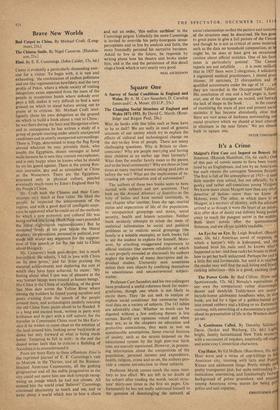Brave New Worlds
Red Carpet to China. By Michael Croft. (Long- mans, 21s.) The Chinese Smile. By Nigel Cameron. (Hutchin- son, 21s.) CHINA is evidently a particularly demanding exer- cise for a visitor. To begin with, it is vast and
exhausting : the combination of endless politeness
and ant-like regimentation bewilders, and the very profile of Pekin, where a whole society of visiting delegations exists separated from the mass of the people in mysterious hotels where nobody ever pays a bill, makes it very difficult to find a sure ground on which to stand before setting out to praise or to criticise. Mr. Michael Croft intel- ligently chose his own delegation as the ground on which to build a book about a visit to China : he was there during the Suez and Hungarian crises, and in consequence he has written a study of a group of people reacting under utterly unexpected conditions and in utterly unexpected surroundings.
There is Tripp, determined to keep the flag flying abroad whatever he may privately think, who insults the Egyptians, shouts messages at hotel walls because he is sure they contain microphones,
and is only happy when he knows what he should be on his guard against.. There is the young Rus-
sian journalist, gay and as astonished at China as the Westerners. There are the. Egyptians, interested only in physical culture, puzzled eventually much more by Eden's England than by the People's China.
Mr. Croft took the Chinese and their Corn- ' m,unism very much at face value. He liked the people, he respected the achievements of the
regime, and with a good deal of intelligent suspi- cion he approved what he could see of the methods by which a new economic and cultural life was being nursed into being:(Both these tours preceded the 'latest nightmarish regimeritations.) But he remained firmly at his post beside the liberal dogmas: no persuasion, personal or political, ever made hiM accept any argument for the suppres- sion of free speech or for the lies told to China about Hungary. . '
Mr. Cameron's book goes. deeper, but is much less critical. He admits, '1 fell in love with China on its own terms,' and far from praising the material achievements and deploring the cost at whith they have been achieved, he states: 'My feeling about what I saw was of pleasure at the way human beings were treated as human beings.' His China is the China of scaffolding, of the great San Men dam across the Yellow River where among the builders he found young novelists and poets creating from the speech of the people around them, and archaeologists tenderly rescuing the old China from plains about to be flooded. It is a long and excited book, written in parts with brilliance and in part with a stiff naiveté, for the traveller in Communist China must be like Eury- dice if he wishes to come close to the emotion of the land around him, looking never backwards or down but only forward at what is being made better. Tempting to fall in with : in the end the doped writer feels that to criticise a Building of Socialism is to misunderstand it.
Poets are more flinty to these influences. Eimi is the reprinted journal of E. E. Cummings's visit to Moscow in the Thirties, 'and all the Russian- bloused American Communists, all the gushing progressives and all the noble progressives in the .city could not move him one inch towards recog- nising an image which he had not chosen. All around him the world cried 'Believe!' Cummings continued obstinately to touch and see, and to write about a world which was to him a chaos and not an order, 'this unfree earthlese in the Cummings jargon. Unluckily the more Cummings is invited to override his petty-bourgeois sense- perceptions and to live by analysis and faith, the more frenziedly personal his narrative becomes. Asked to live in the future, he responds by writing about how his theatre seat broke under him, and in the end the persistence of this detail clogs a book which is very nearly very good.
NEAL ASCHERSON


























 Previous page
Previous page